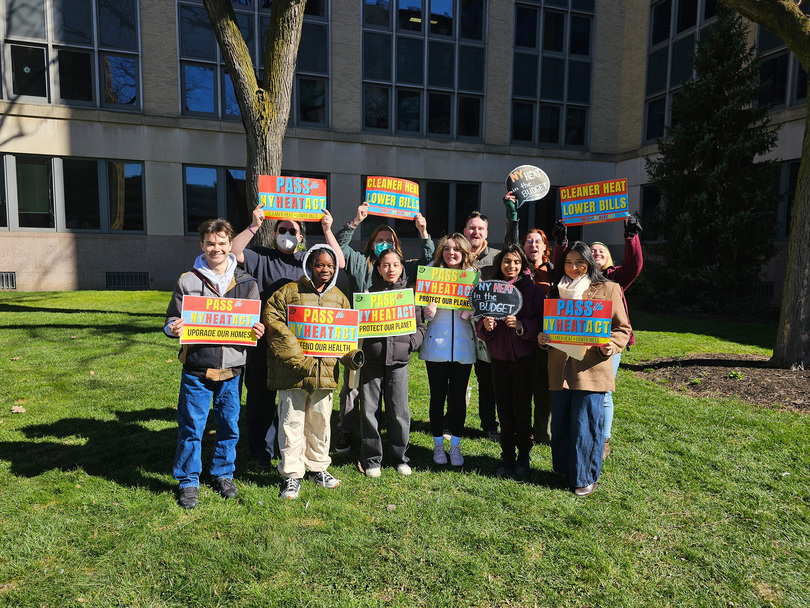N.Y. Public Interest Research Group continues environmental efforts in Syracuse

NYPIRG has led environmental advocacy efforts in New York state for decades. With changing federal policies, the group is now leading information campaigns to spread awareness on the threat Trump poses to the environment. Courtesy of NYPIRG SU/ESF Chapter
Get the latest Syracuse news delivered right to your inbox.
Subscribe to our newsletter here.
Since the New York Public Interest Research Group was founded in 1976, the nonprofit has led various environmental advocacy efforts that have, in some cases, contributed to legislative change.
But, since President Donald Trump’s return to the White House, the group has faced newfound challenges as it works to overcome the administration’s efforts to weaken environmental protections.
Under Trump’s command, the United States Environmental Protection Agency has undone regulations that would have pushed power plants and carmakers toward cleaner forms of energy while eliminating the “good neighbor rule” that regulates downwind air pollution, CNN reported. Trump is also pressuring the EPA to review and possibly rescind policies limiting greenhouse gases such as methane and nitrous oxide.
Reece Holt, NYPIRG’s project coordinator for its Syracuse University and SUNY ESF chapter, said the organization has launched multiple petitions to protest Trump’s anti-environmental policies and spread awareness about their impact. Holt said the organization has had success on campus — garnering 500-600 signatures on most of its petitions — but has struggled to earn the attention of local and state leaders.
“The biggest struggle that we faced in passing the legislative priorities that we’ve been fighting to pass for years now has always just been that New York state has a slow bureaucracy,” Holt said. “Governor Hochul is taking a long time, frankly, to pass out and release the climate regulations we’ve been fighting for. She is delaying a very crucial renewable investment that will help make New York safer and cleaner for everybody who is living here.”
On March 21, NYPIRG co-hosted a Demand Climate Leadership press conference in downtown Syracuse to make their platform known to state officials like Hochul. Jessica Singh, an SU senior and NYPIRG’s project manager for environmental protection, said the conference also aimed to call out the state’s government for its inaction in regards to environmental protection.
Singh, an international relations and policy studies major, said she was surprised there weren’t more students at the conference and encouraged her peers to contribute to the organization’s efforts. While acknowledging the widespread impact of Trump policies, she said young people have a responsibility to educate themselves and focus on the environmental threats of the new administration.
“There is a lack of communication and advertisement about these initiatives,” Singh said. “SU students should know what’s going on beyond the community and I think we need to form a bigger coalition by doing larger scale events in order to engage our peers.”
Matthew Huber, a geography and environment professor at SU’s Maxwell School of Citizenship and Public Affairs, echoed Singh. He said a “powerful political movement” is the only way to prevent environmentally harmful policies.
To combat these policies, he said people will need to unify and magnify their concerns.
“We have a huge need to start rapidly decarbonizing or transitioning the energy system away from fossil fuels and towards clean energy,” Huber said. “But, it’s really a big political problem to figure out how you can take on the socioeconomic class of people who have all this power over all this capital invested in fossil fuel infrastructure.”
On SU’s campus, Singh is spearheading NYPIRG’s Earth Week events through her Reduce, Reuse, Recycle campaign. The campaign, set for the last two weeks of April, will focus on promoting environmental initiatives through campus collaborations and community engagement.
Trump’s 25% tariffs on sustainable raw materials like foreign aluminum and steel entering the U.S. will likely contribute to New York state’s growing trash crisis. The tariffs, which Trump formally announced Wednesday as part of his promised “Liberation Day,” limit the import of many sustainable single use materials, such as aluminum. As a result, companies will be forced to increase plastic use.
The recycling rate of plastic bottles and jars was 29.1% in 2018, compared with the recycling rate of 50.4% in aluminum beer and soft drink cans. This decrease puts added pressure on New York’s “anemic and slipping” recycling rate, according to NYPIRG.
Singh said NYPIRG is advocating for the modernization of the “Bottle Bill” in response to Trump’s policies.
The 1982 bill, which NYPIRG led advocacy campaigns for, aimed to reduce litter and solid waste that would otherwise end up in landfills by allowing people to redeem a nickel upon deposit of their returnable containers like bottles or aluminum cans. The bill has not been updated since it was passed nearly 40 years ago, but it has still been effective, as litter from beverage containers has been reduced by 70 percent.
To improve participation, NYPIRG is partnering with SU/ESF professors for a panel discussion and a thrift fashion show co-organized by University Girl Magazine, with help from SU’s Student Association. The group will also host a bottle drive in collaboration with UGirl.
“You don’t have to be a project leader. You can just be a regular chapter member and you’ll have basically the same opportunities as an intern,” Singh said. “It really does set you up for opportunities that you never thought you would be able to do.”





